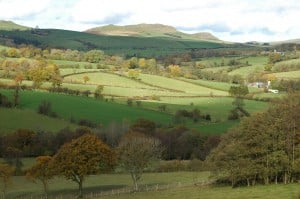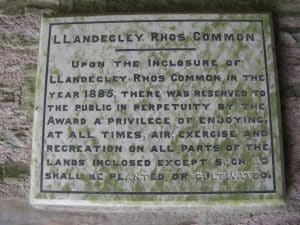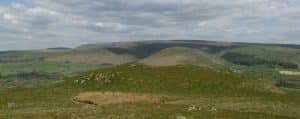On the eve of the public inquiry into Hendy Wind Farm’s appeal against Powys County Council’s refusal of planning permission for seven wind-turbines near Llandegley Rocks, we have renewed our call for rejection of the plans.
We are backing the Campaign for the Protection of Rural Wales and many other organisations and individuals who oppose the scheme. In written evidence to the inquiry we argue that the turbines would desecrate the beautiful countryside around Llandegley, five miles east of Llandrindod Wells, Powys.
 Llandegley Rocks: this view be obliterated by the proposed seven 110-metre-high wind turbines. Photo: Diana Hulton
Llandegley Rocks: this view be obliterated by the proposed seven 110-metre-high wind turbines. Photo: Diana Hulton
The application, first submitted by Hendy Wind Farm Ltd in 2014, was refused by Powys County Council’s planning committee in April 2017. The developers appealed to the Planning Inspectorate. A 5-day public inquiry will open on 13 March, at 10am, at The Pavilion, Spa Road, Llandrindod Wells. The public is invited to attend.
We object to the turbines because they would destroy the natural beauty and people’s quiet enjoyment of the splendid landscape, marring the views of and from the prominent Llandegley Rocks. They would interfere with public paths and access land including registered common.
Moreover, we have revealed that if the turbines are built they may be in breach of inclosure awards and therefore unlawful.
The land on which it is proposed to construct at least four of the seven turbines and their associated development is part of an area inclosed in 1885 by inclosure awards for Llandegley Rhos and Hendy Bank. These awards grant the public a right of access here and protect the land from injury.
The relevant part of the inclosure award says:
And I declare that I do reserve to the Public a privilege at all times of enjoying air exercise and recreation on all parts of the lands to be inclosed which shall be unplanted or uncultivated for arable purposes. And I direct that in the fences of the Allotments gates or stiles shall be placed at convenient intervals at or about the places shown upon the Map hereunto annexed for the purpose of securing access for the Public but in the exercise of the privilege hereby reserved no injury shall be done to the lands or to the herbage or to the fences or to the stock or game or to anything upon such lands. And I declare that in the event of a belt of trees being planted the Public shall not thereby be deprived of the privilege hereinbefore reserved but that access shall be provided by means of paths or openings through the belt of trees to the uncultivated or unplanted land.
Clearly, we say, it would be contrary to the awards to build wind turbines on the awarded land.
 A summary of the inclosure award is on a tablet in the porch of Glascwm church
A summary of the inclosure award is on a tablet in the porch of Glascwm church
The access track to the turbines would be sited on common land. The applicants would have to win consent from the Welsh ministers to deregister the common—and provide suitable land in exchange to which the public does not already enjoy access. We doubt there is any such land in the area that would be eligible. The applicants would also need consent for works on common land.
So we consider there to be a number of technical reasons why the turbines cannot be sited here, in addition to the fact that they will destroy a beautiful area.
Says our general secretary, Kate Ashbrook: ‘From the slopes and summit of Llandegley Rocks the view is breathtaking, with a glorious sweep which takes in the hills and mountains of Wales, including the Brecon Beacons to the south. This view would be utterly destroyed by the siting of wind turbines here, and a massive area of great natural beauty and cultural significance would be irreparably damaged.
![]() The Brecon Beacons from Llandegley Rocks
The Brecon Beacons from Llandegley Rocks
‘One can wander freely over Llandegley Rocks, and there are also several public paths. People walk and ride here because of the magnificent landscape and fine views. The wind turbines would deter them from doing so and would result in loss of the tourist income which is a pillar of the local economy.
‘We have urged the inspector to reject the appeal and ensure this beautiful, much-loved landscape can remain unspoilt,’ says Kate.
 The Radnorshire Hills from Llandegley Rocks
The Radnorshire Hills from Llandegley Rocks

